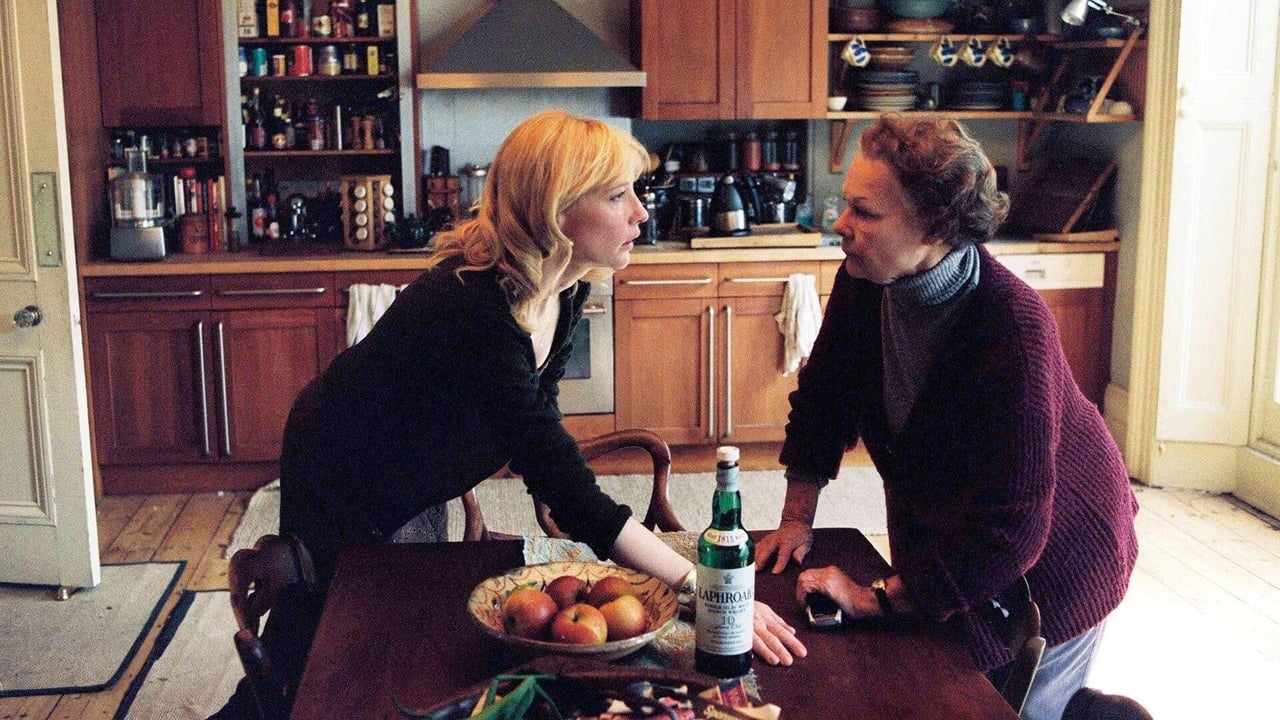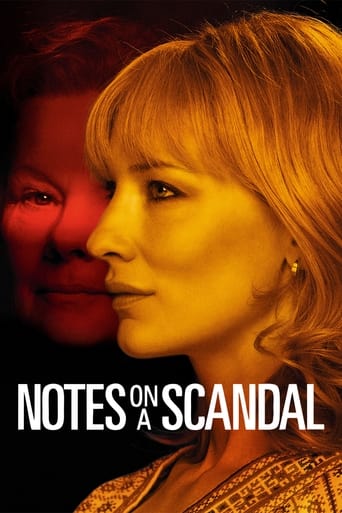

Friendless, bitter history teacher at a bustling British high school is at first appalled by--and then strangely drawn to--a new arrival: the lovely, earthy young art teacher who wants everyone to fall in love with her. The flirtatious nature of this ethereal newcomer draws a strapping 15-year-old student into the picture, a sticky situation of which the spinster becomes well aware, eventually using the turn of events to her advantage. For the better part of an hour, director Richard Eyre hypnotically weaves an intriguing web of mismatched lives intersecting within secret complicity and, ultimately, tragedy. Working from Zoe Heller's novel "What Was She Thinking: Notes on a Scandal", screenwriter Patrick Marber creates an absorbing whirlpool of emotional characters and private feelings, while Judi Dench's elderly Barbara alternately seethes and smiles like a Cheshire cat. Both Dench and Cate Blanchett are amazing, however Eyre allows a few of the supporting players too much slack, and the melodrama which takes over in the final third becomes overwrought as a result. Still quite good, with a dangerously dreamy ambiance sweeping its dueling divas up in a cloud of conflict and little gold stars. *** from ****
... View MoreThe world of the staff room and classroom offers great potential for drama, given the way that schools bring the young and the old(er) into close, daily contact in the context of what is - at face value at least - the noble and worthwhile mission of education. Of course, as Dame Judi Dench's jaded teacher character (the aptly-named) Barbara Covett makes clear from almost the very start of the film, the mission gains further edge when it unites in one place the working class kid with the resolutely middle-class teacher, and yet more so when the educational gap is viewed cynically (if sadly perhaps correctly) as unbridgeable. Covett leaves us in no doubt that she is an observer, but also a manipulator, par excellence, and her life of rather unfulfilled professional and emotional ambition has evolved to the point where meticulously-documented long-game attempts to position people (especially women) where she wants them has become her raison d'etre. Into this world, this established institutional scenario, comes that most archetypal of literary heroes, the new teacher - in the (not-unappealing) shape of (the again pithily-named) Sheba Hart, known to we the filmgoers as Cate Blanchett. She is to be the initially-cool and then wildly-buzzing fly increasingly enmeshed in the web patiently and steadily spun by spider Barbara Covett. And this is the fun part for those watching, since Sheba's "whiter-than-white" -ness (in every sense of the term) rapidly gives way to a kind of chaos, as her joy at finding a pupil interested in what she has to teach (coolly but powerfully played by Andrew Simpson) gives way to justifiable-if-risky favouritism and affection, and then perhaps-unavoidable, but clearly-unethical lust. There are a few erotic fireworks at this point that can claim to tip the viewer off moral balance in a small way, just as they have achieved the same effect on the grand scale between the characters involved. And just as Dame Judi's icy control makes for a spellbinding performance, so does Blanchett's "disintegration" and descent into a chaos that impinges on the lives of a number of others, not least a by-no-means innocent but kindly-enough husband (well-enough done by Bill Nighy). Such a story perhaps befits a more tempestuous Latin kind of a setting, but the makers are too clever by half to give us that clichéd way out. No, this is humdrum, lower middle-class, superficially well-organised and sedate London, in which the most spectacular setting we can come up with is a rather damp and cloudy hillside park. And of course this only adds to the contrast between the apparently "everyday" circumstances, and the truly extraordinary, yet very persuasive train-wreck of a story that unfolds and engulfs the two (three?) main characters, and all around them. It's a quite upsetting watch, in some ways, but one is ever-aware that real-life issues are being raised here, about what can and must happen - at least from time to time, when two different worlds collide...
... View MoreEven though the setup is rather formulaic, NOTES ON A SCANDAL is a well-executed story about secrets and manipulative relationships, while also slipping in some commentary on gender and class. Judi Dench and Cate Blanchett star as high school teachers who become friends when the former finds about the latter's illicit relationship with a student. However, Judi Dench's character has motives of her own that are gradually revealed as the film progresses. For all of the film's trappings as this "friend becomes a stalker" type of story, Judi Dench and Cate Blanchett's performances anchor it in reality and give it a classy feeling that a lot of other similar films lack. I must say that I completely bought Judi Dench as an aging schoolteacher. Cate Blanchett also did a nice job in a role that I haven't really seen her play before, and a degree of vulnerability that she didn't really show in something like LORD OF THE RINGS. Seeing as her character gets caught doing something rather stupid, it would be easy to just dismiss her character as unlikeable from the get-go, but the way the plot develops actually makes her quite sympathetic (at least compared to Judi Dench's character). If there's anything I can find fault with, it's that the plot really doesn't aspire to be anything other than a melodramatic thriller. Thankfully, the performances and overall execution of the material, along with the direction and cinematography lend it some much-needed credibility. I also loved Philip Glass' score. Overall, NOTES ON A SCANDAL is quite predictable, but it sets itself apart by its pedigree in front of, and behind, the camera.
... View MoreThis story of friendship and adultery turns out to be pathetically banal, and this trait is emphasized by Richard Eyre's extremely academic depiction of it. Most of the situation or relationships are contrived or don't seem very credible, and the scenes follow each other in a completely boring linearity, not to mention Judi Dench's annoying voice-over who by the way is perfect as a solitary, bitter old woman. To make things worse, the soundtrack is completely incoherent and omnipresent, not giving the viewer a rest from start to finish. It's hard to believe this movie was nominated in the most prestigious competitions, including the Oscars in 4 categories, the level of cinematographic creation being close to zero.
... View More